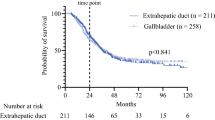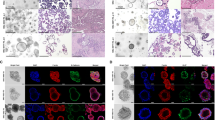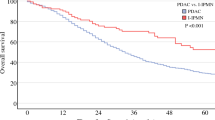Abstract
Purpose
In 2019, the National Comprehensive Cancer Network (NCCN) recommended genetic testing for all patients with pancreatic ductal adenocarcinoma (PDAC). To evaluate the status of implementation of these guidelines in a loco-regional setting, we performed a retrospective, observational study among patients with newly diagnosed PDAC who received oncologic care at Northeast Georgia Medical Center in Georgia.
Methods
Chart abstraction of patients with newly diagnosed PDAC from 1 January 2020 to 31 December 2021 was performed to include information on genetic testing recommendation and completion, and time from diagnosis to testing. The deidentified dataset was then analyzed using appropriate descriptive and associative statistical testing.
Results
Of the cohort of 109 patients, 32 (29.4%) completed genetic screening; 16 (14.7%) were screened within 10 days of diagnosis. Among the 77 (70.6%) patients who did not receive genetic screening, 45 (41.3%) were not recommended genetic screening despite treatment intent with standard of care therapy. However, 32 (29.4%) were not recommended genetic screening in conjunction with a desire to pursue palliative care/hospice/or due to terminal illness.
Conclusions
The study highlighted the gap in implementation of NCCN guideline-directed genetic testing in PDAC patients as only a third underwent testing suggesting the need for systematic processes to facilitate testing. The test was more likely to be completed if done early in the course, especially soon after the diagnosis. Research is needed to explore discussing genetic testing for the large proportion of patients who are terminally ill at diagnosis where genetic screening would potentially benefit the family members.
Similar content being viewed by others
Data availability
The data used within this study are from a single institution obtained from patient electronic medical records and de-identification was carried out using the safe harbor method. The data described within this manuscript, identification codes used to identify the study sample, the script for data analysis from the corresponding author are available upon request.
References
Siegel RL, Miller KD, Wagle NS, Jemal A (2023) Cancer statistics, 2023. CA Cancer J Clin 73(1):17–48. https://doi.org/10.3322/caac.21763
Petersen GM (2016) Familial pancreatic cancer. Semin Oncol 43(5):548–553. https://doi.org/10.1053/j.seminoncol.2016.09.002
Pilarski R (2019) The role of BRCA testing in hereditary pancreatic and prostate cancer families. Am Soc Clin Oncol Educ Book 39:79–86. https://doi.org/10.1200/EDBK_238977
Brown TJ, Reiss KA (2021) PARP inhibitors in pancreatic cancer. Cancer J 27(6):465–475
Couch FJ, Johnson MR, Rabe KG, Brune K, de Andrade M, Goggins M, Rothenmund H, Gallinger S, Klein A, Petersen GM, Hruban RH (2007) The prevalence of BRCA2 mutations in familial pancreatic cancer. Cancer Epidemiol Biomarkers Prev 16(2):342–346. https://doi.org/10.1158/1055-9965.EPI-06-0783
Zhen DB, Rabe KG, Gallinger S, Syngal S, Schwartz AG, Goggins MG, Hruban RH, Cote ML, McWilliams RR, Roberts NJ, Cannon-Albright LA, Li D, Moyes K, Wenstrup RJ, Hartman AR, Seminara D, Klein AP, Petersen GM (2015) BRCA1, BRCA2, PALB2, and CDKN2A mutations in familial pancreatic cancer: a PACGENE study. Genet Med 17(7):569–577. https://doi.org/10.1038/gim.2014.153
Hu C, Hart SN, Polley EC, Gnanaolivu R, Shimelis H, Lee KY, Lilyquist J, Na J, Moore R, Antwi SO, Bamlet WR, Chaffee KG, DiCarlo J, Wu Z, Samara R, Kasi PM, McWilliams RR, Petersen GM, Couch FJ (2018) Association Between Inherited Germline Mutations in Cancer Predisposition Genes and Risk of Pancreatic Cancer. JAMA 319(23):2401–2409. https://doi.org/10.1001/jama.2018.6228
Stoffel EM, McKernin SE, Brand R, Canto M, Goggins M, Moravek C, Nagarajan A, Petersen GM, Simeone DM, Yurgelun M, Khorana AA (2019) Evaluating susceptibility to pancreatic cancer: ASCO provisional clinical opinion. J Clin Oncol 37(2):153–164. https://doi.org/10.1200/JCO.18.01489
National Comprehensive Cancer Network. Clinical practice guidelines in oncology (NCCN Guidelines). Genetic/familial high-risk assessment: breast, ovarian, and pancreatic version 1.202—December 4, 2019. NCCN.org.
NCCN guidelines. NCCN Guidelines for Pancreatic V.1.2022—Annual on 07/08/2021
Patt D, Gordan L, Diaz M, Okon T, Grady L, Harmison M, Markward N, Sullivan M, Peng J, Zhou A (2020) Impact of COVID-19 on cancer care: how the pandemic is delaying cancer diagnosis and treatment for American seniors. JCO Clin Cancer Inform. https://doi.org/10.1200/CCI.20.00134
Unger JM (2022) Cancer care during COVID-19-a shock to the system. JAMA Netw Open 5(4):e228864. https://doi.org/10.1001/jamanetworkopen.2022.8864
Chen RC, Haynes K, Du S, Barron J, Katz AJ (2021) Association of cancer screening deficit in the United States with the COVID-19 pandemic. JAMA Oncol 7(6):878–884. https://doi.org/10.1001/jamaoncol.2021.0884
Zeilinger EL, Lubowitzki S, Unseld M, Schneckenreiter C, Heindl D, Staber PB, Raderer M, Valent P, Zöchbauer-Müller S, Bartsch R, Prager G, Jaeger U, Gaiger A (2022) The impact of COVID-19 on cancer care of outpatients with low socioeconomic status. Int J Cancer 151(1):77–82. https://doi.org/10.1002/ijc.33960
Chittenden A, Haraldsdottir S, Ukaegbu C, Underhill-Blazey M, Gaonkar S, Uno H, Brais LK, Perez K, Wolpin BM, Syngal S, Yurgelun MB (2021) Implementing systematic genetic counselign and multigene germline testing for individuals with pancreatic cancer. JCO Oncol Pract 17(2):e236–e247
Dragojlovic N, Borle K, Kopac N, Ellis U, Birch P, Adam S, Friedman JM, Nisselle A (2020) GenCOUNSEL study; Elliott AM, Lynd LD. The composition and capacity of the clinical genetics workforce in high-income countries: a scoping review. Genet Med 22(9):1437–1449. https://doi.org/10.1038/s41436-020-0825-2. (Erratum in: Genet Med. 2020 Jul 10, PMID: 32576987)
Acknowledgements
We are in great appreciation of our institution and research department for assisting with data collection for the sole purpose of this study.
Disclaimer
The information and perspective from this manuscript are the responsibility of the author and not the institution that the author is affiliated with.Disclaimer The information and perspective from this manuscript are the responsibility of the author and not the institution that the author is affiliated with.
Funding
The authors state that there were no external funds, grants, or other forms of financial support received in the development of this manuscript.
Author information
Authors and Affiliations
Contributions
AKG, SB, OA, SR, DS assisted with the conception and study design. AKG, SR assisted with acquisition of data. AKG, SB, OA, SR, AIR, DS assisted with interpretation of data. AKG wrote the main manuscript text. AKG, SR, and AIR helped with preparing Tables 1 & 2. All authors reviewed the manuscript, approved of the final version, and agreed to be accountable for all aspects of the work.
Corresponding author
Ethics declarations
Competing interests
The authors have no financial or non-financial interests related to this manuscript to disclose.
Ethical approval
The study described in this manuscript was performed within the ethical standards of 45 CRF 46. The study was approved of IRB exemption by a local university affiliated Institutional Review Board.
Consent to participate
The study is a retrospective observational study of secondary data from a single institution. There was no direct contact with human subjects for this study.
Additional information
Publisher's Note
Springer Nature remains neutral with regard to jurisdictional claims in published maps and institutional affiliations.
Rights and permissions
About this article
Cite this article
Ghosh, A.K., Bhushan, S., Abidoye, O. et al. Evaluating implementation of NCCN guideline-directed genetic screening recommendations for patients with pancreatic ductal adenocarcinoma. Cancer Causes Control 35, 679–684 (2024). https://doi.org/10.1007/s10552-023-01825-5
Received:
Accepted:
Published:
Issue Date:
DOI: https://doi.org/10.1007/s10552-023-01825-5




